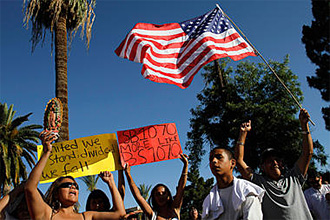
|  |  |  Editorials | Issues Editorials | Issues  
Mexico Issues Sharp Rebuttal to Arizona Immigration Law
 Sara Miller Llana - Christian Science Monitor Sara Miller Llana - Christian Science Monitor
go to original
April 26, 2010


| | People protest against Senate Bill 1070 outside the Arizona State Capitol in Phoenix, Sunday. Arizona's tough new immigration law has renewed calls for Washington to reform federal immigration laws, and protesters decried the state's action as a violation of US civil rights at a rally on Sunday in the state's capital. (Joshua Lott/Reuters) |  |
Citizens and officials in Mexico reacted angrily to the new Arizona immigration law signed Friday, with Mexican President Felipe Calderón saying it hindered collaboration along the border region.

Mexico City - Ana Olivera’s uncles have lived in Arizona for two decades without proper paperwork, working under the radar as bricklayers and at other odd jobs. So she's steaming that the new Arizona immigration law signed Friday by Gov. Jan Brewer could get them suddenly kicked out.

“They have the right to be there, they are good workers,” says Ms. Olivera, a secretary in Mexico City, even though she admits her uncles originally crossed illegally. “When Americans come here to work, we treat them with respect. They should do the same with us.”

Ms. Olivera is not the only person here reacting angrily to the new immigration law, dubbed as the toughest on the books in America. Mexican President Felipe Calderón himself issued a strong rebuttal of it over the weekend.

“The criminalization of the migration phenomenon, far from contributing to the cooperation and collaboration between Mexico and the US, represents an obstacle for the solution of common problems in the border region,” the president said, promising to work with Mexicans abroad for the protection of their human rights, regardless of their immigration status.

The law, which has also set off a storm of debate in the US, makes it a crime to be in the state of Arizona illegally and requires people in Arizona suspected of being illegal immigrants to show proof of legal residence when asked by law enforcement. Governor Brewer and advocates of the law say it’s the only way forward, as the border deals with increasing violence while Washington, they say, is doing little to help.

But Analicia Ruiz, a professor of international relations at Anahuac University in Mexico City, says Mexicans are angered by a move they see as politically motivated. “Mexicans have added so much to the North American economy,” she says. “It’s a political message, a radical one. But it does not represent the reality.”

Mexico condemns Arizona law

Nevertheless, she says condemnation, even from the highest levels in Mexico, will do little to change the course of the debate north of the border.

President Calderón was joined by Patricia Espinosa, the foreign affairs secretary of Mexico, and a slew of newspaper columnists in condemning the law. Lawmakers of all political parties told the local press they were calling for economic boycotts to punish Arizona.

Ms. Espinosa said in a statement that she regrets that the state of Arizona did not consider “the valuable contributions of immigrants to the economy, society, and culture of Arizona and the United States."

Given the violence plaguing the border region, she said that it is only with mutual respect and trust that the two nations can work together. She said the Mexican government will reconsider the “viability and usefulness of the cooperation schemes that have been developed with Arizona.”

Conflicting desires

To many Mexicans, the new law symbolizes America's conflicting desires.

On the one hand US businesses want cheap labor, though Americans are also afraid of losing jobs to foreigners.

Even though Juan Hernandez Reyes, who works with his wife overseeing the maintenance of a business office in Mexico City, has no relatives in Arizona, he says the law resonates here because it symbolizes the US's historic hypocrisy.

“We are good workers, we know how to work hard and do the work Americans won’t,” he says. “It is Arizona that is losing out.”
|

 |
|  |



